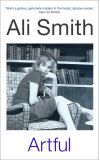
20 Nov 2012 00:51:06
After a year mourning the death of her lover, a woman picks up her old Penguin edition of Oliver Twist, drops herself into an armchair and starts reading. Moments later she hears someone coming up the stairs. She looks up. "It was you… your clothes were smudged, matted, torn. You were wearing that black waistcoat with the white stitching that went out of fashion in 1995… you looked bruised." I can't remember the last time I felt so instantly and wholly drawn into the imagined past and present of two barely described fictional characters. One is alive – grieving, reading, thinking. The other is dead yet apparently intent on returning: to hang around, to watch TV, to steal mugs and tweezers and pencil sharpeners, to mumble indistinctly and allow herself to be a perpetually "smudged" and messy presence, beloved and ever so slightly unwelcome at the same time.
The dead woman, a writer, was working on some lectures when her life ended. The living one – both more wary and more credulous when it comes to words – works with trees. Trees are something Ali Smith has always described with great passion and conviction and here they are wonderfully evoked – spreadingly alive and expansive and as generous in possibility as the human mind.
It's tempting of course to think that both women are embodiments of Smith herself. But I wonder whether it's simply a testament to the strange, clammy power of this work that I began to be obsessed with the idea that I'd once seen a photo of the author in that waistcoat with the white stitching.
Still, this book is not a novel, nor even short stories, but rather a collection of four essays – lectures that Smith gave at Oxford University under the headings "On Time", "On Form", "On Edge" and "On Offer and On Reflection". So it is, in a way, even more unsettling that here in the book they're – fictionally anyway – credited to a dead person. But then you sense Smith relishes this sort of befuddled response. She likes to mess with your head – to jar and disorientate, to twist ideas out of their formal boundaries and make them crash around like irascible poltergeists.
If this book has a central subject, it's the relationship between thought and art (though that makes it sound far more annoying than it ever is). The cast is huge and illustrious. Imagine a boozy, free-associating dinner party with (among many others) the surrealists, Katherine Mansfield, WG Sebald, Lee Miller, Shakespeare, Forster, Colette, Pasternak, Jackie Kay and Freud – with Smith as maître d' and a tape of Lionel Bart's Oliver! looped in the background.
But even that doesn't begin to describe this all-singing, all-dancing exploration of how thought feeds off words and words nourish thought. It launches you on daydreams through thickets of words, it runs splashing through phrases as if they were puddles, or it drops clauses into the stream, Poohsticks style, and rushes to the other side of the bridge to watch them emerge.
And woven in among all of this playfulness is a story of loss that is as raw and chilly as it is haunting. The dead lover speaks what appears to be gobbledygook but turns out to be Greek. Her eyes are "black spaces", her nose less and less there. And she starts to smell enough to make neighbours push notes through the letterbox.
She proves light-fingered, too, taking the TV and DVD remotes. And yet. As the bereaved one lies in bed "beside myself in the grit and dust of you", she'll take whatever happens next "because it knows us inside out, the imagination".
And maybe in the end that's what the book really is: a seductive and compelling case for the power of the imagination. Or – to go back to Dickens – a gorgeous and artfully dodging work of "shifting possibility". Or, in the words of Katherine Mansfield who, on finishing DH Lawrence's Aaron's Rod, compared it to a tree "firmly planted, deep thrusting, outspread, growing grandly, alive in every twig. All the time I read this book I felt it was feeding me." Back to trees, then, a perfect leitmotif for the unstoppable nourishment of literature. And there is food and substance in this wonderful, deeply original book.

